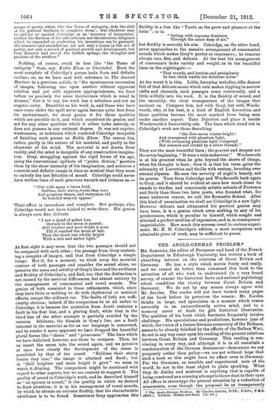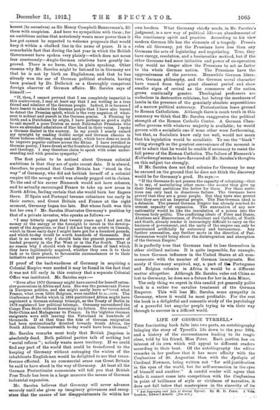THE ANGLO-GERMAN PROBLEM.* Ma. SAROLEA, the editor of Everyman and
head of the French Department in Edinburgh University, has written a book of absorbing interest on the relations of Great Britain and Germany. He has a style which moves freely and easily, and we cannot do better than commend this book to the attention of all who wish to understand (in a very broad survey, of course) the historical facts and national psychology which condition the rivalry between Great Britain and Germany. We do not by any means always agree with Mr. Sarolea. The reader will not have turned many pages of the book before be perceives the reason : Mr. Sarolea thinks in large, and speculates in a manner which comes naturally to an extraordinarily active mind, and to a memory never at fault for glib historical illustration. The qualities of his book which fascinate frequently involve challenge. His speculations and predictions, however (one of which, the vision of a future German suzerainty of the Balkans, seems to be already falsified by the effects of the Balkan War), do not in any way react upon his reading of the present relations between Great Britain and Germany. This reading is con- vincing in every way, and although it is in all essentials a condemnation of the German demeanour—demeanour we say purposely rather than policy—we are not without hope that such a book as this might have its effect even in Germany. For the Germans, as sensible and experienced men of the world, do not in the least object to plain speaking. What they do dislike and mistrust is anything that is capable of being construed as a cunning attempt to throw dust in their eyes. All offers to stereotype the present situation by a reduction of armaments, even though the proposal be as transparently
• TM Atigio.Gerin Problem. By Chiles Enrolee, D.Litt., F.B.S. (Edin.). London : Nelson and Sons. [214. net.]
honest (to ourselves) as Sir Henry Campbell-Bannerman's, fill them with suspicion. And here we sympathize with them ; for an ambitious nation that notoriously wants more power than it has got cannot be expected to welcome proposals that would keep it within a chalked line in the name of peace. It is a remarkable fact that during the last year in which the British Government have spoken very plainly—which does not mean less courteously—Anglo-German relations have greatly im- proved. There is no harm, then, in plain speaking. Other reasons why Mr. Sarolea might be listened to in Germany are that he is not by birth an Englishman, and that he has already won the ear of German political students, having been praised by Dr. Delbrfick as a thoroughly competent foreign observer of German affairs. Mr. Sarolea says of himself
"If, then, I cannot pretend that I am completely impartial in this controversy, I may at, least say that I am writing as a true friend and admirer of the German people. Indeed, it is because I have learnt to admire the German people that I have also learnt to detest the Prussian spirit, which is the very negation of what- ever is noblest and purest in the German genius. A Fleming by birth and a Dutchman by origin, I have perhaps as good a right to call myself a pure Teuton as most Nationalist Prussians who have an abundant admixture of Slav blood in their veins. I spoke a German dialect in the nursery. In my youth I nearly ruined my eyesight by reading Gothic script and German classics in those hideous editions, cheap and nasty, which have done so much to improve popular culture across the Rhine. I have revelled in German poetry, I have drunk at the fountain of German philosophy and theology. I may therefore claim to speak with some under- standing and with genuine sympathy."
The first point to be noticed about German colonial ambitions is that they are of quite recent date. It is absurd, therefore, to pretend that Great Britain has "stood in the way" of Germany, who did not bethink herself of a colonial empire till the savage world was already pegged out in claims. To the end of his career Bismarck would not have colonies, and he actually encouraged France to take up new areas in North Africa, feeling certain that she would burn her fingers there. If Spain and Portugal became colonizers too early in their career, and Great Britain and France at the right moment, Germany began too late. But whose fault was this but her own ? Mr. Sarolea illustrates Germany's position by that of a private investor, who speaks as follows :—
. "I may bitterly regret that twenty years ago I had not the money or the energy or the foresight to invest in the develop- ment of the Argentine, or that I did not buy an estate in Canada, which in those early days I might have got for a hundred pounds, and which to-day would be worth hundreds of thousands. But that is no reason why I should hate the present possessors of landed property in the Far West or in the Far South. That is no reason why I should wish to dispossess them of land which they have legitimately acquired, whether they owe it to their luck or to their pluck, to favourable circumstances or to their initiative and perseverance."
If proof of the backwardness of Germany in acquiring a Colonial Empire were needed it may be found in the fact that it was not till early in this century that a separate Colonial Office was instituted. Mr. Sarolea says
"Even after 1870 Germany might have carved for herself exten- sive possessions in Africa and Asia. She was the paramount Power in European politics, and she might easily have achieved what France, what even little Belgium, were enabled to ac“ieve. The Conference of Berlin which in 1884 partitioned Africa might have registered a German colonial triumph, as the Treaty of Berlin in 1878 registered her political triumph. Germany surrendered the Congo Free State without foreseeing its future. She surrendered Indo-China and Madagascar to France. In the 'eighties German emigrants were still leaving the Vaterland in hundreds of thousands. If at that time the tide of German emigration had been systematically directed towards South Africa, the South African Commonwealth to-day would have been German."
Mr. Sarolea remarks most truly that British jingoism is absolutely dead. Both political parties talk of nothing but "social reform " ; nobody wants more territory. If we could find any part of the world that could be transferred to the keeping of Germany without outraging the wishes of the inhabitants Englishmen would be delighted to see that trans- ference effected. In no commercial sense can Great Britain be said to have stood in the way of Germany. At least all the German Protectionist economists will tell you that British Free Trade has been in a large measure the means of German industrial expansion.
Mr. Sarolea believes that Germany will never advance securely until she gives up imaginary grievances and recog- nizes that the causes of her disappointments lie within her own borders. What Germany chiefly needs, in Mr. Sarolea's judgment, is a new way of political life—an abandonment of, the reactionary spirit and practice. According to his view modern German life has the elements of a tragedy. Prussia rules all Germany, yet the Prussians have less than any Germans the arts of legislating and negotiating. True, they have energy, resolution, and a businesslike method, but if the other Germans had more initiative and power of co-operation, they would no longer allow the Prussians to act as factor to the whole German nation. The Prussians have the, aggressiveness of the parvenu. Meanwhile German litera-
ture, German philosophy, and the German moral character. have waned from their great classical period and show,
smaller signs of revival as the commerce of the nation., grows continually greater. Theological professors are audacious in destructive criticism, but betray the meekness of lambs in the presence of the genuinely obsolete superstitions of a narrow political autocracy. Protestantism loses ground to Roman Catholicism. Although there is much truth in this summary we think that Mr. Sarolea exaggerates the political strength of the Roman Catholic Centre. A German Chan- cellor governs with whatever majority is available; he would govern with a socialistic one if none other were forthcoming, but that, as Socialists know only too well, would not mean that his legislation would be socialistic. To use the "blank" voting strength as the greatest convenience of the moment is not to admit that he would be unable if necessary to resist the full power of the Roman Catholics. The failure of Bismarck's Kulturkampf seems to have flavoured all Mr. Sarolea's thoughts on this subject too strongly.
If Mr. Sarolea does not find colonies for Germany he may be excused on the ground that he does not think the discovery would be for Germany's good. He says
"If the Germans do not possess the capacity of colonizing—that is to say, of assimilating other races—the sooner they give up their Imperial ambitions the better for them. For these ambi- tions can only land in disastrous failure. The Germans have proved that they are a great people. But they have also proved that they are not an Imperial people. The Pan-German ideal is a delusion. The present German Empire has already reached its utmost capacity of expansion. The annexation of any new nationality would be like the inoculation of a poison into the German body politic. The conflicting ideals of Poles and Danes, Alsatians and Hanoverian, of Protestant and Catholic, of North and South, already render it increasingly difficult to carry on the business of government, and the unity of the empire can only be maintained artificially by autocracy and bureaucracy. Any further annexation, any further move in the direction of Pan- Germanism would bring about the disintegration and absorption of the German Empire."
It is perfectly true that Germans tend to lose themselves in other civilized nations. It is quite impossible, for example, to trace German influence in the United States at all com- mensurate with the number of German immigrants. But surely if Germany acquired, say, a part of the Portuguese and Belgian colonies in Africa it would be a different matter altogether. Although Mr. Sarolea rules out China as lost to Germany, he does see a future for her in Asia Minor.
The only thing we regret in this candid yet generally polite book is a rather too cavalier treatment of the German Emperor. This will lose Mr. Sarolea some sympathy in Germany, where it would be most profitable. For the rest the book is a delightful and romantic study of the psychology of a powerful but angular people trying to win their way through to success in a difficult world.











































 Previous page
Previous page